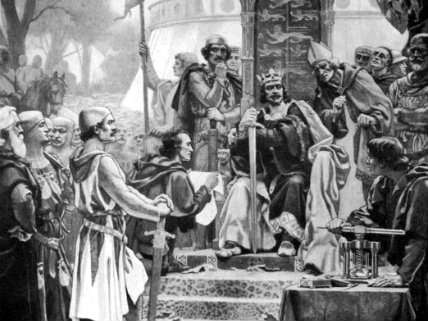Sheldon Richman on What Magna Carta Has to Do With Libertarian Strategy

Magna Carta was an agreement a group of rebellious barons forced on King John on June 15, 1215, at Runnymede, a meadow on the Thames in England, about midway between London and Windsor Castle. The barons were fed up with the king's demands for revenue to finance war in France and John felt compelled to agree to their demands to rein in his power; in his estimation, refusal would have brought less-desirable consequences. The English branch of the Catholic church also had an interest in protecting itself from the king, and its concerns were addressed in the document, all 63 clauses of which were written in Latin on a single sheet of sheep-skin parchment.
It's tempting to think of Magna Carta as a declaration of the limits of state power and therefore as an early charter of libert, writes Sheldon Richman. But the arguments against this perspective are persuasive. It contains little if any political philosophy. It's also important to note that the barons were not interested in everyone's liberty but only the liberty of a small minority of free men. Yet even if it wasn't actually a charter of liberty, it is regarded as such—by people who have widely differing views on liberty. And this, argues Richman, has implications for libertarian strategy today.


Show Comments (0)